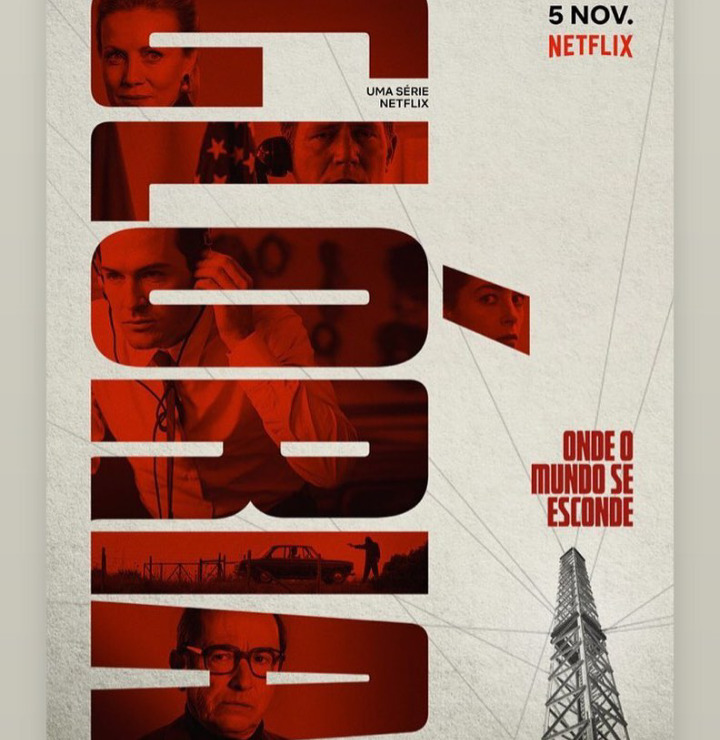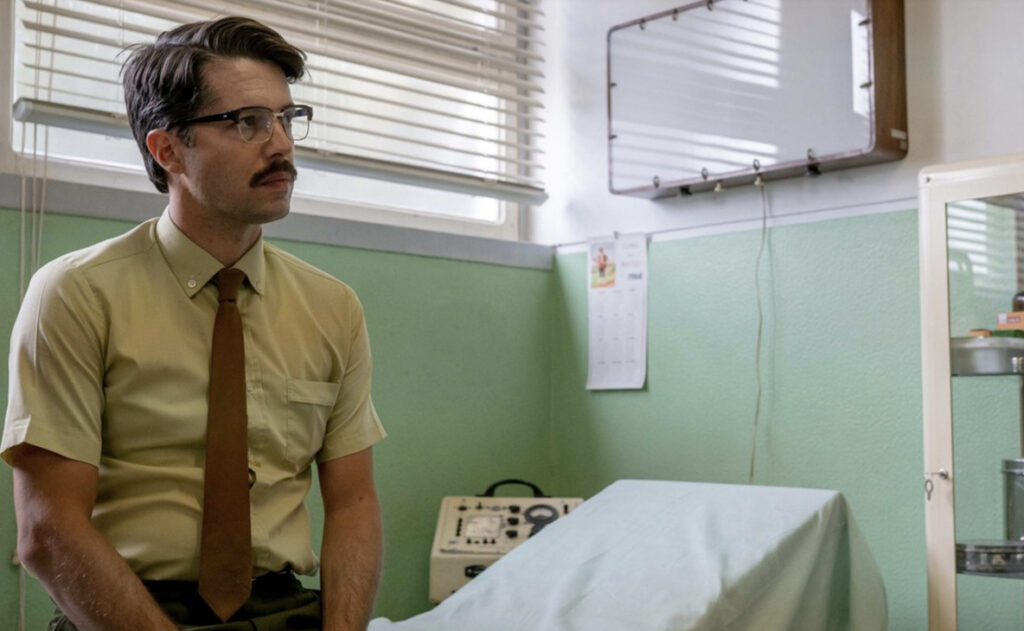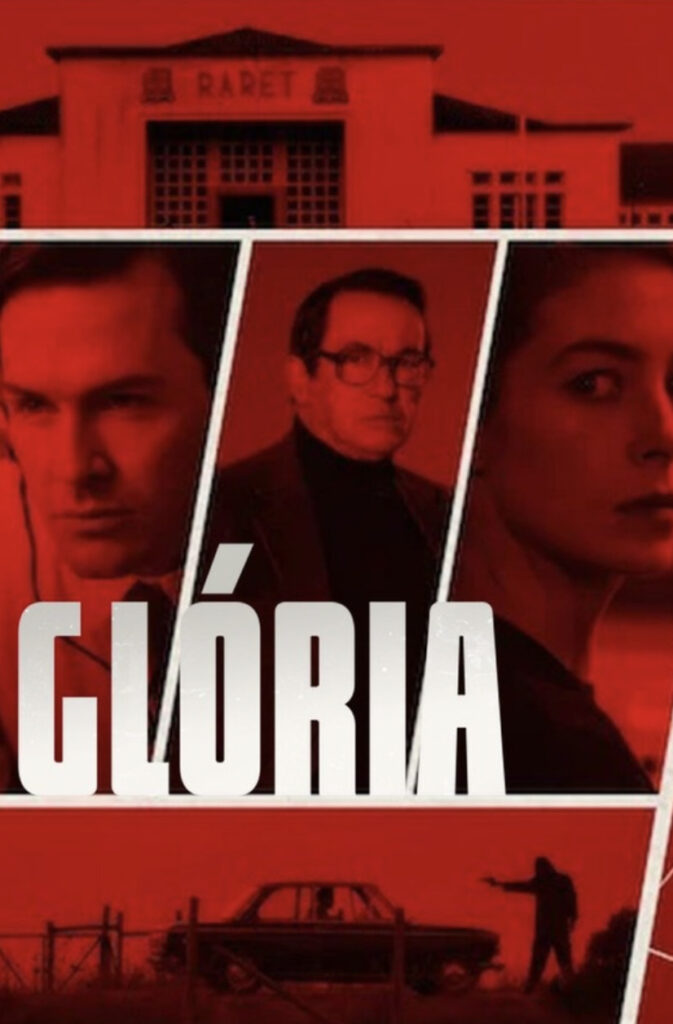
Synopsis : A small town in Portugal becomes engulfed in a web of political intrigue when a young engineer is recruited as a KGB spy.
- Creator: Pedro Lopes
- Starring: Miguel Nunes, Stephanie Vogt, Matt rippy, Jimmy Taenaka, Victoria Guerra
- TV Network: Netflix
- Premiere Date: Nov 5, 2021
- Genre: Mystery thriller

Exclusive Interview with Creator Pedro Lopes
Q:As a Professor in Storytelling, I see you effectively used it – as I was intrigued, mesmerized and glued to my TV as I watched each episode of your series. A lot of my readers are filmmakers. Can you give us the magic sauce to your masterpiece if it’s ok to give out your trade secret ? (PedroLopes Theory in Screenwriting).
P.L : First of all, I want to say that I became a teacher – I teach at a public university (ESCS) and a private university (UCP) – out of a sense of social commitment. I feel it is my obligation to contribute to the strengthening of the audiovisual industry, even if in a modest way. I was an autodidact who was lucky enough to be writing prime-time fiction by the age of 24, but I learned by doing, at a time when there were few professional screenwriters in our market.
Meanwhile, I have been taking workshops abroad over the years. But not everyone has the financial capacity to take workshops in London, Los Angeles or New York, and so our obligation as an industry is to allow those who want to be screenwriters to take quality training in Portugal.
As for the secret, I try to tell stories that are meaningful to me, that provide good entertainment, but that simultaneously bring us a reflection about the complexity of the human being and the social construction of reality. I think we may be losing this ludic sense of storytelling. In today’s world (for now more in the American and Anglo-Saxon world than in the rest of Europe) we begin to feel a certain conditioning, we can only write about ourselves, about our community and never about others, and I worry about this closing that the culture of cancellation has been bringing to artists.
There are many stories that interest me. In the case of Gloria, what fascinated me most was trying to write characters who were strongly conditioned by certain mental structures, which were a reflection of economic, political and geographical factors. For me the biggest difficulty is not finding a good story, but knowing how best to tell it, and that’s the part that takes up most of my time.
Q : I may say my favorite in the Series is the character ofJoão Vidal, perfectly played by Portuguese Actor Miguel Nunes, can you tell us how inspite of his hero / anti hero persona he was still the most human or humane in the world that was RARET ? Can you describe to us how you write to create such a rich, complex and interesting character for this lead role?
P.L : João Vidal is a character under permanent construction. He grew up in a privileged context, but his passage through Africa, through the war in the colonies, will shake his conviction in the regime, which was based on the propaganda of the “good colonizer”. From the moment his eyes see the brutality of war and colonial exploitation, his certainties are challenged. Then, when he returns to Portugal, he realizes the social asymmetries, and there he feels he has to take a stand, even though he doesn’t know what stand to take, because he is beginning to have access to a world he didn’t know.
In Portugal, during the dictatorship, there were democratic movements, but the communist party was the only one at that time that had an organized and combative underground structure, which fascinates our protagonist. But only when he joins the organization will he realize that the imposed discipline does not allow for his own thinking. In a way, he is a victim of the bipolar world, where there is no room for consensus, which in a way is similar to the world today, even though the geopolitical context has apparently changed. There is a character, James, who says that we always think we are living in a special moment, but all generations have thought this way, all have had their particular challenges, wars, financial crises, and struggles for social recognition.
Q : For us who are not familiar of the 60’s Portugal, can you explain what RARET was at the time of the Cold War Era? For you, is this a symbol of anything happening in Modern day Portugal ? Why did you choose this storyline and why do you think Netflix chose “GLORIA” as it’s first Portuguese Netflix Original Series?
Pedro Lopes: Raretwas a radio center, which aimed to bring news to Eastern bloc countries free from the censorship of the communist regime. But more than that, it was an American and Western propaganda weapon that was part of the non-military component of the cold war. The Raret complex stretched over 200 hectares, had some 500 workers and operated for more than 45 years, but almost nobody in Portugal knew of its existence. It was an American city with schools, hospitals and maternity hospital, tennis courts and swimming pools, all in the middle of the countryside where complete poverty reigned.
The reason Raret was located in that place, where roads had to be built for the transmitters to get there, was because it was at the right distance for shortwave broadcasting to the Eastern Bloc. The recordings were made in Germany, but broadcast from Portugal, because the Portuguese dictator never wanted to question his position of neutrality, and this was always a game he played with the Americans. Raret, and the Lages air base in the Azores, which was essential for the American fleet to be able to refuel in the middle of the Atlantic, were instrumental in the relationship between the two countries, not forgetting that from an ideological point of view, although different, they were allies against communism, and this was one of the reasons why the fascist dictatorships in Portugal survived.
I grew up hearing Raret stories because my grandfather was an employee of Emissora Nacional, the state radio station, and often went to Raret because he worked directly with the engineer who scouted the land for the Americans. From those people who lived far away from everything I could tell a bigger story, that of the world in the cold war period.
Q : As you are an experienced Writer for Short Film, Feature Films and TeleNovelas, there was a special feeling to write for this Netflix Series. Were there parameters set by Netflix? Please inspire my filmmaker readers how the process was from Script to the Pitch to being Greenlit by Netflix and the Production and Post Production Phase ?
P.L : My experience may not serve as an example because it was all very smooth. I went to Madrid to pitch to Netflix, they asked me to write the first episode right away, and after reading it I got the green light without asking for a single change. At the beginning of the process I asked if I should take anything into consideration, and the answer they gave me was to write the series I wanted and tell the story the way I believed in. Those words were incredible, because they trusted the vision I had for the project, which we screenwriters are not used to.
Probably because we are a peripheral country, where financial investment is still not big, it brought me this advantage of not having the pressure of making blockbusters that have the obligation to win massive audiences all over the world. However, in writing Glória, I had that same goal, to reach as many people as possible, in Portugal and in the territories where Netflix is present, but telling a Portuguese story and from a narrative point of view being influenced by everything I like, that is, the American narrative structure, and the European way of developing characters, with psychological complexity.

Q : As an Academe and a Professor of Cinema and Storytelling please tell us the importance in spending time and effort to do the research on this script. The details in all historical aspects of the show seem to be evident in the series.
P.L : Research is one of the most interesting parts, that’s why I said at the beginning that I don’t want to tell my story all the time, but the story of others. Obviously we choose subjects that interest us for some reason, but that doesn’t mean that the characters think the same way I do, nor do I want to be confused with them. I studied History at University and even became a high school history teacher before writing for film and television, so I’ve always had a passion for libraries.
I know it takes more time, but I don’t use researchers to do this work for me and the writing team – I often say that I have some culture on useless subjects, but which then help me to relate different themes, or to compose a particular point of view of a character. In the case of Glória, after the episodes were written by me and a talented team of screenwriters, I had the help of an historical consultant, and who read everything to confirm that there were no factual mistakes, but also that we had not allowed ourselves to be contaminated by contemporary ways of thinking.
Q : I’m fascinated and am proud of you, your cast and your production team for winning multiple awards for this show, I know that you have been nominated numerous times and won a lot too throughout the years, how does it feel to win and what is your advice to us storytellers and filmmaker in pursuing this dream of ours.
P.L : The awards are the recognition of your peers in the industry, and can increase the degree of confidence that production companies and broadcasters have in you, in the sense that you are able to deliver what you promised when you submitted a synopsis. Honestly, I prefer to always look ahead, look for new themes, try not to repeat myself in formulas, but nevertheless reflect on previous projects and try to learn from mistakes. And here I’m not just talking about the writing, but about all the processes from casting, to shooting and post-production, because right now I’m involved in all these processes.
Q : A lot of us would feel this Series is relevant right now as we all feel the effects of the War in Ukraine, as we see the behind the scenes of the US, Russia and Portugal intelligence teams ( CIA, KGB and PIDE ) in what they do to try to stop or start a war. Have you heard any feedback about how Citizens of the world can relate to your show to what is happening right now in terms of War and Peace ?
P.L : The series was written, filmed and premiered before the invasion of Ukraine, but I had long felt from what I read that a new geopolitics was beginning to unfold, with new players not restricted to the United States of America and Russia, but now including China, India, Turkey, etc. For me, the major relation that the series established with the present was the control of the media and the manipulation of public opinion. And that was particularly evident in Russia, but also in the United States of America. In Europe I had seen Brexit and the whole campaign that led to the UK’s exit from the European Union. But there were other issues that were important to me, like the role of women, as well as the relation between the elites and the political power.

Q: In life, in relationships even at work Loyalty is always questioned. This seem to be a recurring theme in all the Episodes of Gloria. Can you tell us all about it in terms of the characters development in the show?
P.L : This is a question that for me was central when I started thinking about the characters: what moves them, what are their convictions, how do they evolve and what are they capable of doing because of political convictions or just to survive. Those who read and like Shakespeare know how jealousy, ambition, envy and betrayal are powerful feelings that often lead to destruction. Basically, what interests me is the same as what interests most playwrights and screenwriters, which is to make a study of the human soul.
Q : Behind all this squabbles, sabotage of secret agents, is the theme of “Love and Crimes of Passion.” Please relate to us the importance of this theme in storytelling and how it made Gloria so effective and memorable. Please also comment on … In the real world out there why is Love normally transactional ?
P.L : Today’s society is obsessed with sex, especially its performative side, which is now present in almost all fiction, but I don’t think we talk about love that much, because it is difficult to write about it. First because all happy families are the same, the unhappy ones are unhappy in their own way, as Tolstoi said, and so it is natural that we are afraid of falling into ridicule or melodrama. But the truth is that much of what we do is driven by that feeling.
Q : I highly recommend everyone to watch your Masterpiece called “GLORIA” available now on Netflix, do you have any parting words to everyone who will watch the show for the first time because of this interview. Thank you on agreeing to do this interview. Congratulations ! Thank you in advance !
P.L : Luis, I want to thank you for your kind words and to make a public compliment to everyone who made this series, director, cinematography, art direction, actors. I hope that this series will arouse interest in Portuguese fiction, as well as in fiction from peripheral countries. The more closed we are about our domestic reality, the more difficult it is for us to accept others and to understand the complexity of the world.
Check out more of Luis’ articles.
Here’s the trailer of the series.

